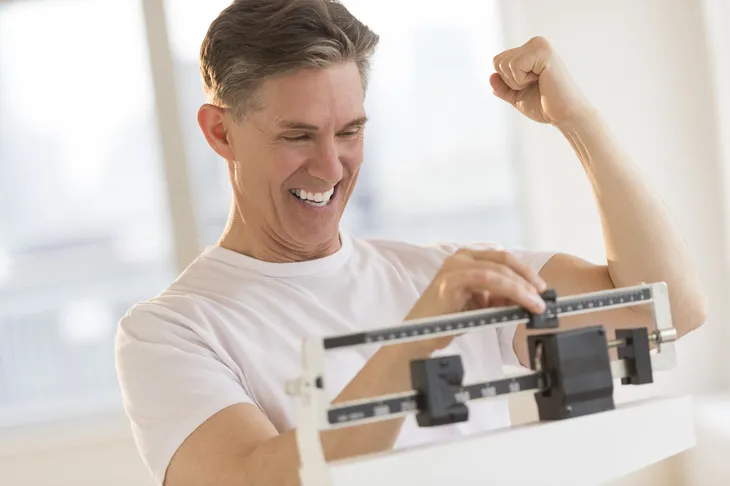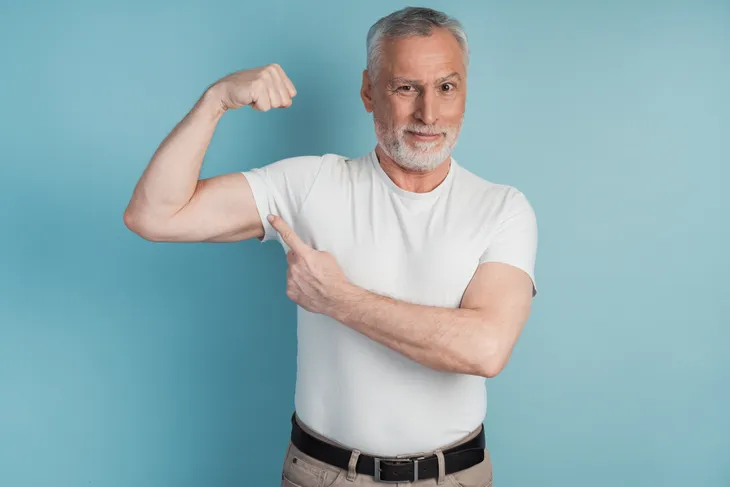- Many people believe that men can lose weight faster than women. But is there scientific evidence to back up these claims?
- Either way weight loss is not an easy task, regardless of your gender.
- The best way to lose weight is gradually and sustainably.
Anyone who has tried to lose weight knows that it’s not easy. It requires hard work, dedication, and motivation. Many even believe that men have some sort of advantage and can lose weight easier and faster than women. But are the rumors true?
In this article, we’ll explore how weight loss differs in men and women to find out if men, in fact, do lose weight faster. We’ll also look into a few effective weight loss tips to help you along your journey. Let’s dive in!
Do Men Lose Weight Faster Than Women?
It turns out a lot of people are onto something. Men do often lose weight faster than women. WebMD explains that men typically have more lean muscle tissue which helps burn more calories and in turn, body fat. So, when men and women are in the same calorie deficit, men often lose more weight. However, the source says this is true but only in the short term.
Dietician David Grotto, RDN, self-proclaimed “guyatician” and author of The Best Things You Can Eat tells the source that “Over the long-term, the playing field is more equal.” Additionally, the source also notes that when sedentary men and women begin fitness programs, men also often lose body fat while women don’t.
Men May Gain More Health Benefits From Weight Loss
Lucky for men, it turns out they gain more benefits than women when they lose weight too. One study analyzed the weight loss results of over 2,000 overweight adults. Each adult had prediabetes and was instructed to follow an 800-calorie diet. Healthline explains at the end of the study, 35-percent of men and women obtained normal blood glucose levels and were no longer prediabetic. But the men had some other notable benefits.
The source says that the men had a lower heart rate, less body fat, and a lower risk for diabetes than the women. The women, on the other hand, experienced some negative impacts like greater reductions in high-density lipoprotein (HDL) cholesterol (the “good” cholesterol). They also had greater reductions in bone mineral density and decreased lean body mass which slowed the metabolism.
Why Weight Loss May Be More Noticeable in Men
Weight loss can also be more immediately noticeable in men than it is in women. This is because men usually carry their weight in their midsection. Women, on the other hand, tend to store fat more spread out which can make it less noticeable.
Healthline also points out that this is yet another advantage for men. The weight you carry around your midsection is called visceral fat which can increase your risk for heart disease, stroke, and type 2 diabetes. When men lose this type of fat it not only helps decrease these risks but it also “supercharges your metabolism and helps you burn more calories,” explains Healthline.
The type of fat women tend to store is called subcutaneous fat which the source says is important for childbearing and menstruation but it doesn’t benefit your metabolic health, which may also play a role in the slower rate of weight loss.
Why Do Men Lose Weight Faster?
So the question still remains, why do men lose weight faster anyway? What it ultimately comes down to is how men and women are built. Healthline explains that men are built to burn fat more quickly because they “have more lean muscle mass and a naturally higher metabolic rate.” This means that if men and women eat the exact same amount of calories, men would have a larger calorie deficit than women because they burn more calories.
Additionally, women are physiologically made to store more fat, thanks to estrogen levels. WebMD says this is “an assumed evolutionary adaptation to help during pregnancy.” Women tend to carry 6- to 11-percent more body fat than men, and since they tend to have lower muscle mass than men, it can be difficult for women to maintain weight loss. Hormonal fluctuations can also trigger stress eating in women which can make losing weight even more difficult.
Weight-Related Advantages for Women
While this may be discouraging for women to hear, it’s important to not let this prevent you from living a healthy lifestyle. Women also have some notable weight-related advantages too. For starters, as we mentioned earlier, women tend to hold weight in healthier places than their midsection, such as the thighs or backside.
WebMD also points out that women are better at storing fat and “tend to burn more body fat during exercise than men do.” Women also have a hard time losing the type of fat that is typically least harmful to health.
The Benefits of Weight Loss for Men and Women
While many people choose to lose weight to improve their physical appearance, it’s important to not fixate on this. Weight loss can benefit more than what’s on the surface and the ultimate goal should be to improve your overall health. So how can weight loss benefit men and women?
The Centers for Disease Control and Prevention (CDC) says that even modest weight loss (5- to 10-percent of your total body weight) can produce health benefits like improved blood pressure, blood cholesterol, and blood sugars. Weight loss can also help improve energy levels, physical mobility, general mood, and self-confidence.
Weight Loss Tips for Men and Women
If you’ve decided that you’d like to lose weight, it’s important to remember that the number on the scale is just a number and not a reflection of your overall health. It’s best to work with your doctor to analyze your current health and to find out what a healthy weight is for you. After all, 200-pounds may be healthy for one individual and not for another.
Have your doctor check your weight, cholesterol levels, blood pressure, blood sugar, and any other conditions you may be at risk for. Your doctor will be able to help you establish healthy goals that you can work towards. Now, let’s take a look at a few effective ways you can lose weight successfully and sustainably.
Don’t Compare Your Journey to Others and Start Slow
While it may be discouraging to learn that men can lose weight faster than women, WebMD points out that it’s still hard work for both males and females. And ultimately, anyone can lose weight, regardless of their gender, it just takes commitment. So it’s important to not compare your journey to others and focus on yourself, your goals, and your progress only.
It’s important to lose weight gradually. While you may want to wave a magic wand and lose weight overnight, the CDC says, “people who lose weight gradually and steadily (about 1 to 2 pounds per week) are more successful at keeping weight off.” Healthy weight loss also shouldn’t be focused on a diet or program, it should be an ongoing lifestyle change that includes healthy eating habits and regular exercise.
Stop Yo-Yo Dieting
Are you a yo-yo dieter? Yo-yo dieting is a pattern of losing weight, regaining it, and then dieting again. If this sounds like you, it’s important to stop if you want to lose weight sustainably and for good. It also happens to be bad for your health.
Healthline outlines a few reasons why you should stop yo-yo dieting, such as increasing your risk for health conditions like high blood pressure, fatty liver, diabetes, and heart disease. Yo-yo dieting can also prevent long-term lifestyle changes and lead to a lot of frustration.
How to Lose Weight Sustainably
While dramatic upfront weight loss results are attractive, the steps it takes to get there are not, and it’s not realistic if you want lifelong success either. According to the CDC, if you want to lose weight successfully, and sustainably it starts with making a commitment, as well as coming up with a well-thought-out plan.
Making a commitment is a big step and the source says it may even be helpful to sign a written contract. You may want to include your current weight, weight loss goal, and changes you plan to make. Additionally, you can also include a list of reasons why you want to lose weight to reflect on daily throughout the process.
Set Realistic Goals
Making the commitment to lose weight is the first step but next, you’ll need to set goals. Just make sure they’re realistic. Losing 20-pounds in 2-weeks is not a realistic goal. The CDC also recommends setting both long-term and short-term goals. A long-term goal could be, “I want to lose 30-pounds and control my high blood pressure.”
Short-term goals are small, such as “I want to walk 20-minutes every day,” or “I want to have a vegetable with every dinner.” Short-term goals should be very achievable and are a great way to”reward your efforts along the way,” explains the source. This can also help keep you motivated.
How you set a goal is important too. The CDC says you should focus on two or three goals at a time. To be successful, each goal should be specific and realistic. This means you shouldn’t say “I want to exercise more”, or “I want to eat healthier.” Be specific, such as “I want to run 1-mile every other day.” The key here is to be realistic so you don’t set yourself up for failure. As you achieve your goals you can set new ones and make them harder.
Give Yourself Grace and Celebrate Small Successes
Losing weight is not easy. If it was, everyone would do it, right? But the fact that you want to take steps to be healthier is already an achievement in itself. It’s also important to give yourself grace and expect setbacks. These can happen for many reasons from holidays to life changes. But it’s important to get back on track as quickly as possible and make note of your setbacks so you can try and avoid them in the future.
Don’t forget to celebrate small successes. Even if you fall off your healthy eating plan one day and follow it the rest of the week, that’s a big win! It’s still a step in the right direction and you don’t want to lose sight of the end goal, your health.
Also, it’s important to have fun. If you absolutely hate running, don’t do it. There are tons of other ways to exercise your body and it will be more enjoyable if it’s something you like doing. The same goes for food. Don’t force yourself to eat Brussels sprouts just because they’re healthy. Find healthy foods you actually like and want to eat.
Lean on Support
Finally, create a support system, whether that means joining a support group, or leaning on a friend or family member. Having a support system can help keep you motivated, especially on the days when you feel like giving up. Your support system should be there to help remind you why you’re on this journey and they can help keep you accountable.
Consider checking in with your account partner (or group) daily or weekly. You can decrease these check-ins as you gain more healthy habits and become more comfortable with your lifestyle.
















